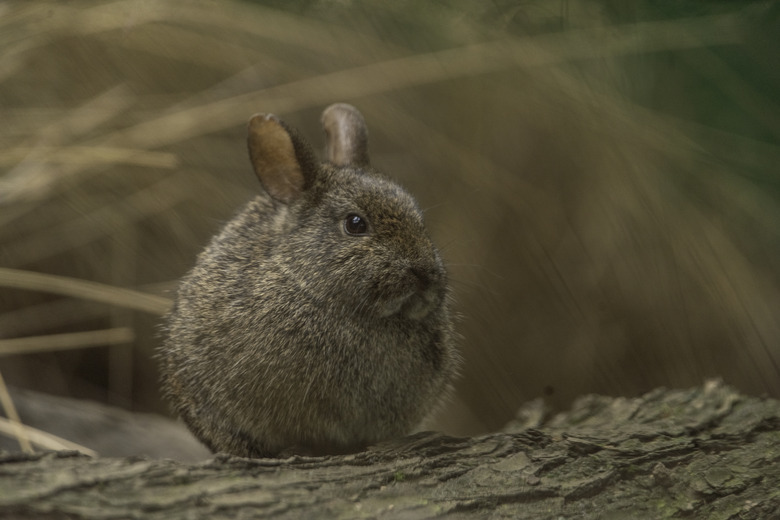How To Tell The Age Of A Rabbit
You can figure out your rabbit's age by determining what life stage she's currently in. Her behavior and physical appearance might give you some clues. While it may be fairly easy to determine the age of some animals by looking at them, this is not always the case with rabbits. If you know what to look for, there are physical and behavioral traits that may help you determine your rabbit's age.
Young rabbit age group
Young rabbit age group
A rabbit's life span is about eight to 12 years, so all rabbit breeds progress through their life faster than humans. Determine his life stage to help you figure out your rabbit's age:
Baby, 0 to 3 months: (Human equivalent, 0 to 10 years): In the beginning, rabbits are totally dependent on their mother. Their eyes open around the 10-day mark, and they wean from their mother at about 6 to 8 weeks old. This is when they start to move around independently and become more lively and playful.
Adolescent, 3 to 6 months: (Human equivalent, 10 to 16 years): Their energy level is rising, and they reach sexual maturity. They may be more aggressive. Females become territorial, and males may try to mount things and spray. Some experience phantom pregnancy. Correct these bad bunny behaviors by spaying/neutering them. Normally, males can be neutered at 3 to 4 months, and females can be spayed at 5 to 6 months.
Teenager, 6 months to 1 year (Human equivalent, 16 to 21 years): Your bunny's age may cause her to become moody and less interested in socializing with you. If your bunny has been de-sexed, exercise may decrease and cause weight gain. Feed your rabbit a high-quality diet. Hereditary dental issues may become noticeable.
Adult rabbit age group
Adult rabbit age group
Young adult, 1 to 3 years (Human equivalent, 21 to 33 years): Your bunny may be most active during this time and needs lots of exercise. She might run around, jump, and dig if given the opportunity. They need a lot of attention and a lot of play time. Grooming happens often and gives them a clean, glossy coat.
Middle age, 3 to 5 years (Human equivalent, 33 to 45 years): Your bunny's activity might slow down. She may become more affectionate with you. It could be a less stressful and more relaxed time for your rabbit.
Late middle, 5 to 7 years (Human equivalent, 45 to 57 years): Your rabbit's age might become noticeable as age-related ailments become an issue. You'll need to help your rabbit keep his bum clean if he can't clean himself properly. He may have sore joints because of arthritis. Check his heels for calluses. They can get sore and may crack and bleed, which could allow infection to set in.
Senior rabbit age group
Senior rabbit age group
Old, 7+ years (Human equivalent, 57+years): Some rabbits are still active at this age, and some slow down. Your bunny's age might make jumping too difficult. Most rabbits will require medication for chronic illnesses. Your rabbit will probably rely on you a lot and put a lot of trust in you. Rearranging his cage might help him access things without needing as much help.
Pay attention to behavioral clues
Pay attention to behavioral clues
Certain behaviors can offer clues to your bunny's age. If your bunny is becoming more active, acting moody, and wanting to socialize with you less, she might be a teenager. A bunny in her teens enters a phase of intense curiosity.
Bunny behavior will differ depending on whether or not the bunny has been desexed. Aggression is a common behavior for intact bunnies, and they often become destructive. If your bunny seems moodier or doesn't want to be around you, don't worry. It's probably just a phase.
Alternatively, an older bunny will likely be slower and may not be interested in jumping. Older bunnies tend to be more affectionate and relaxed. They tend to trust you more and are less aggressive.
Look for signs of aging
Look for signs of aging
While you may not be able to tell right away, there are physical traits that can give you an idea of your rabbit's age, such as the coat. During their younger years, all rabbit breeds normally have a clean, glossy coat. Older bunnies may have a hard time maintaining their coat. A dull coat could mean you have an older bunny.
Another trait that might give you an idea of your bunny's age is the teeth. All rabbit breeds have to wear down their teeth on hard food pellets throughout their life because their teeth never stop growing. Older rabbits tend to eat less food and may not take care of their teeth as well as they used to. This can cause overgrown teeth.
Other traits that may point to your bunny age being older are yellow or brownish teeth, the appearance of sore joints, and weight loss.
